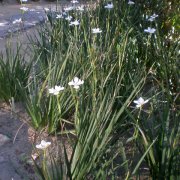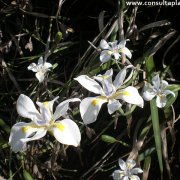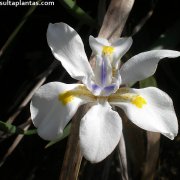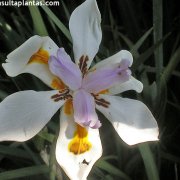Care of the rhizomatous plant Dietes iridioides or African iris |
|
The genus Dietes, family Iridaceae, includes 6 species of rhizomatous perennial plants native to South Africa. Some species are: Dietes iridioides, Dietes bicolor, Dietes grandiflora, Dietes robinsoniana. Common names: Wild iris, Wood iris, African iris, Morea iris, Fortnight lily. This species is native to eastern and southern Africa. They are rhizomatous herbaceous plants that reach 60 cm (1.96 feet) in height. The leaves are sword-shaped and dark green. The curious flowers only last a day but the plant does not stop producing flowers; they are white with dark and orange spots; the central petals are bluish or lilac. They bloom in spring and early summer. African iris is used as isolated specimens, in massifs and on edges under trees or shrubs; it can be grown in pots and planters. In Africa it's used as medicinal plants to treat dysentery and other ailments. Dietes iridioides needs full sun or semi-shade exposure. It can resist frost and even the wind. The soil must be well drained and contain organic matter; add coarse sand and leaf mulch or humus to a garden substrate. Water 2 times a week with 1 glass of water per specimen, waiting for the substrate to dry. They have resistance to drought. Fertilize the soil with humus before planting and with mineral fertilizer for bulbous plants every 20 days during flowering. Wild iris is a resistant plant to the usual pests and diseases. Wood iris propagates by seeds sown in spring or autumn and by division of rhizomes after flowering. |
Images of the rhizomatous plant Dietes iridioides or African iris |
Find plants
Dietes iridioides or African iris | Care and Growing
© 2026 FavThemes



